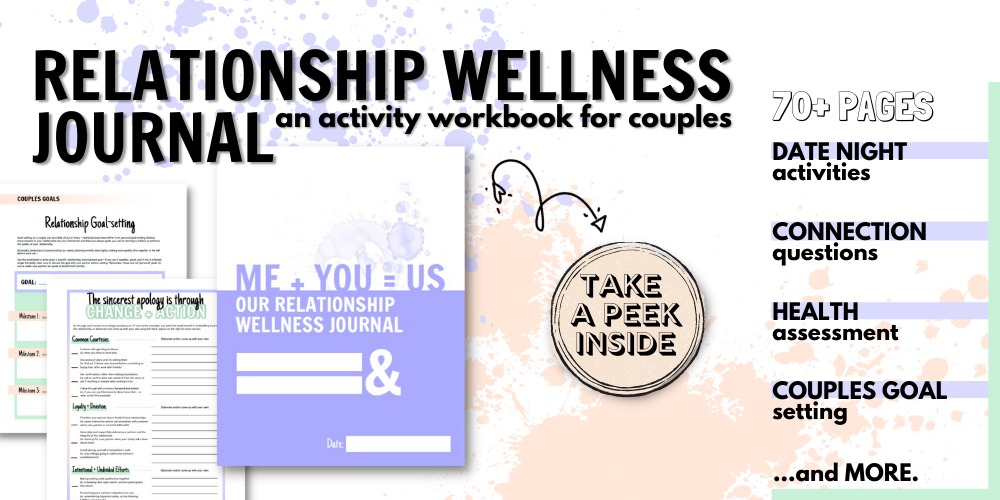To my fellow married peeps out there, this is the tea – an underrated practice you should be implementing if you want your spouse to feel loved every single day. And, obviously, if you’re not married and in a committed relationship…yes, this applies to you as well.
This one slips easily, and a lot – it’s okay! Life isn’t about getting it right all the time, having it all together, or all figured out. Go easy on yourself. Yet there’s no reason we shouldn’t make a proactive effort when it matters most. So grab your favorite mug because I’m going to pour you the cup of tea you needed today.

4 Ways to make your spouse feel loved every day
pay attention to what they *need* to feel loved
This may not be – more than likely won’t be – what you need. So remember, what makes you feel loved shouldn’t be your default in how you show your spouse love.
Also, our needs change. Sometimes on a routine or daily basis – including what we may need to feel loved. Today your partner might really be looking for that verbal support and validation (since it’s their first day at their new job) and tomorrow they may desperately need physical closeness or stimulation (to release any tension or to feel closer *physically*). So it’s important to be more attuned to your partner (this comes with [really] learning more about them beyond the surface) or to be more understanding and empathetic of this ebb and flow.
And for those in the back: having a specific, frequent need (way to feel loved) or changes in those needs doesn’t make a person difficult, too much, or needy.
listen more consciously and compassionately
Of course, being actively involved and attentive to what your spouse does and has to say is super important. This should be no secret or surprise, honestly. Yet we’re not perfect and can probably admit to [often] times where we tune out our partner because of our own stress, problems, unmet needs, lack of interest, resentment – you name it. Hence why listening more consciously and compassionately applies to both fronts – to yourself and your spouse.
You should also be listening not *just* when they’re speaking. What I mean is, bold-faced, when you’re in the presence of one another but not interacting. You could call this similar to “reading the room”.
Have you ever sat on a park bench somewhere, or in a coffee shop, and just watched people going about their day? You can gather a lot about a person if you listen. Mind you, this isn’t the same as making assumptions. You’re not making any judgments or diagnoses of the person and their life, you’re simply taking in. This takes practice, patience, and the ability to do this – listening – to yourself.
As I mentioned above, being more *attuned* to your spouse comes with peeling back and learning the onion layers about them. Not to confuse this for being a “mind-reader”, consciously listening to your spouse on a deeper level simply means gaining a superior level of understanding and compassion for them in order to better understand how to love them.
be receptive of their bids or advances
You’ve probably shrugged off your spouse’s attempt to hug you, or when they told you how beautiful you look – your hair an absolute bird’s nest, unshaven legs, stinky pits, and all. You may have even gawked at the way they arranged the dirty dishes in the dishwasher, even though they took it upon themselves.
We’ve all been there, done it, and likely justified it.
Here’s the thing: when you [consistently] reject your spouse’s attempts to connect (or show you love), you’re denying and preventing true intimacy.
And I get it – we’re not always in the mood or the “right state of mind”. Sometimes we even unintentionally ignore, neglect, or deliberately deny advances, and that can be like saying [to your spouse], “You’re not worthy of me [my acknowledgment/reciprocacy..etc.].” Yikes.
GRANTED, accepting a heart-felt compliment can be difficult, or even triggering if, say… [1] you just got off the phone from having a heated conversation with your mother, [2] you are having a mental breakdown about the way you look/feel, or [3] your spouse did/said something hurtful not long before it. But being receptive doesn’t mean putting on a forceful smile (for the sake or comfort of others) even when you’re upset, but it does mean making an effort in receiving it with kindness. And you can receive it by simply acknowledging it. So the next time your spouse goes in for a hug when the last thing you want is to be touched, you can say, “I’m touched-out right now, but I love your desire for me.” You’re acknowledging their bid while still honoring your feelings without leaving your spouse feeling entirely rejected.
lead with a gentle, softened heart
I’m just saying that when you learn to lead with more gentleness, grace, and softness…all of the above will seem effortless. It may not be perfectly consistent or easy to maintain every single day (I mean, we are human), but the effort will surely be noticed and have an impact.
What does this mean, anyway – leading with a gentle, softened heart? Many will probably take this out of context as if it is directly targeted to specifics, but honestly, this advice goes to anyone, everyone – man, woman, person.
Soft does not mean spineless, and gentle does not mean weak. It does mean to lead by example with humility, meekness, and compassion instead of projection, defensiveness, and opposition.
[mailerlite_form form_id=23]






